Module 5: A Research Paper on the Medical Anthropology of Diseases
VerifiedAdded on 2022/12/23
|9
|2010
|1
Report
AI Summary
This report provides a comprehensive analysis of the medical anthropology of diseases, examining various approaches including ecological, critical, biomedical, applied, and ethno-medical perspectives. It begins by introducing medical anthropology as the evaluation of human health issues and remedial systems within social and cultural contexts, emphasizing its role in understanding and improving health services worldwide. The discussion delves into the five key methods used in medical anthropology to understand disease development: ecological, critical, biomedical, applied, and ethno-medical. Ecological medical anthropology focuses on the relationship between culture and the biophysical environment, while critical medical anthropology examines the economic and political forces that influence health and healthcare systems. Biomedical anthropology combines physical and medical anthropology to study the effects of diseases on human populations, and applied medical anthropology deals with the practical applications of medical anthropology in public and clinical health. Ethno-medical anthropology explores the beliefs and healing practices within different communities. The report concludes that a crucial analysis of cultural background, along with these various approaches, is necessary to assess diseases and structure preventive healthcare plans, highlighting the importance of balancing the relationship between healers and patients.
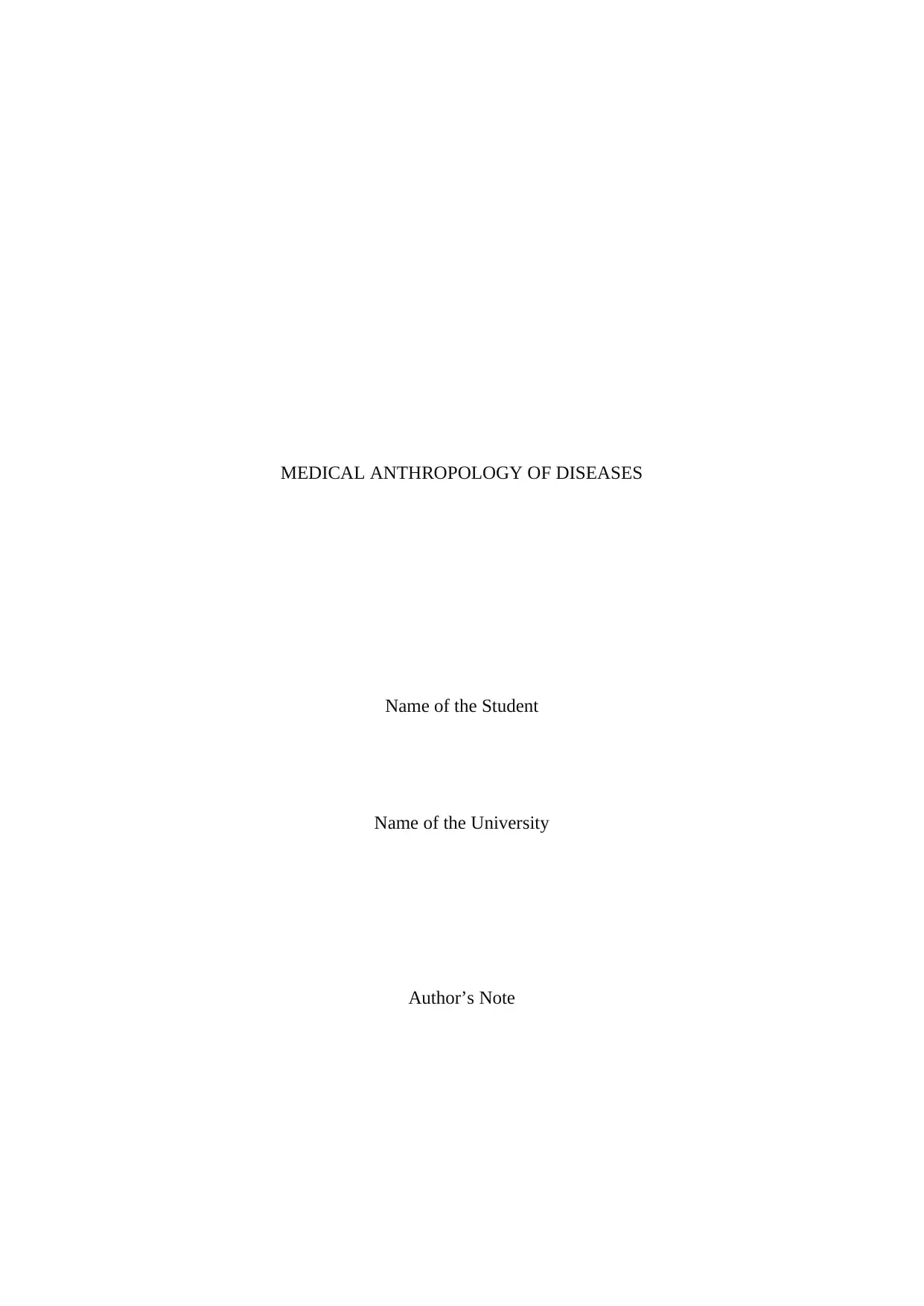
MEDICAL ANTHROPOLOGY OF DISEASES
Name of the Student
Name of the University
Author’s Note
Name of the Student
Name of the University
Author’s Note
Paraphrase This Document
Need a fresh take? Get an instant paraphrase of this document with our AI Paraphraser
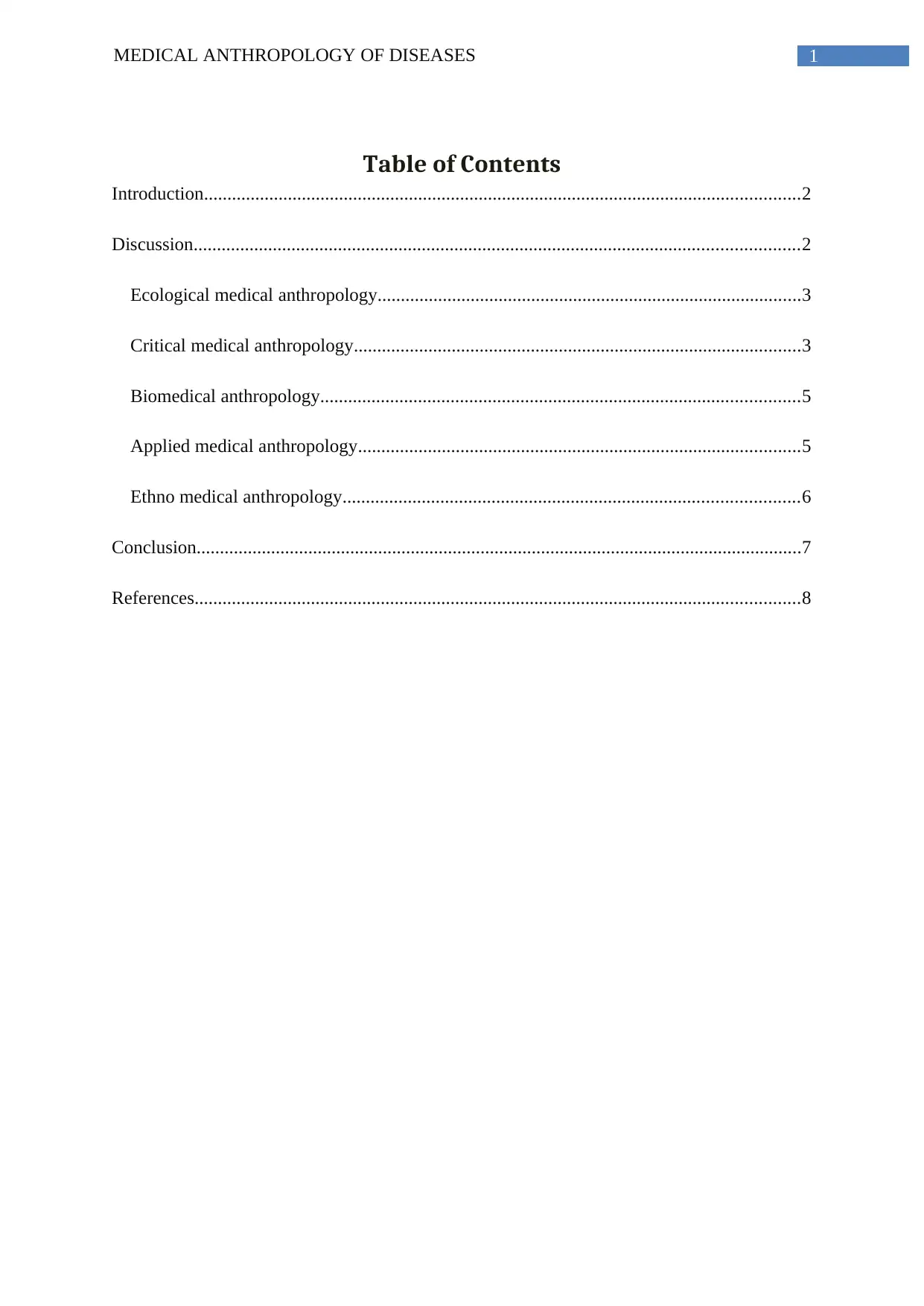
1MEDICAL ANTHROPOLOGY OF DISEASES
Table of Contents
Introduction................................................................................................................................2
Discussion..................................................................................................................................2
Ecological medical anthropology...........................................................................................3
Critical medical anthropology................................................................................................3
Biomedical anthropology.......................................................................................................5
Applied medical anthropology...............................................................................................5
Ethno medical anthropology..................................................................................................6
Conclusion..................................................................................................................................7
References..................................................................................................................................8
Table of Contents
Introduction................................................................................................................................2
Discussion..................................................................................................................................2
Ecological medical anthropology...........................................................................................3
Critical medical anthropology................................................................................................3
Biomedical anthropology.......................................................................................................5
Applied medical anthropology...............................................................................................5
Ethno medical anthropology..................................................................................................6
Conclusion..................................................................................................................................7
References..................................................................................................................................8
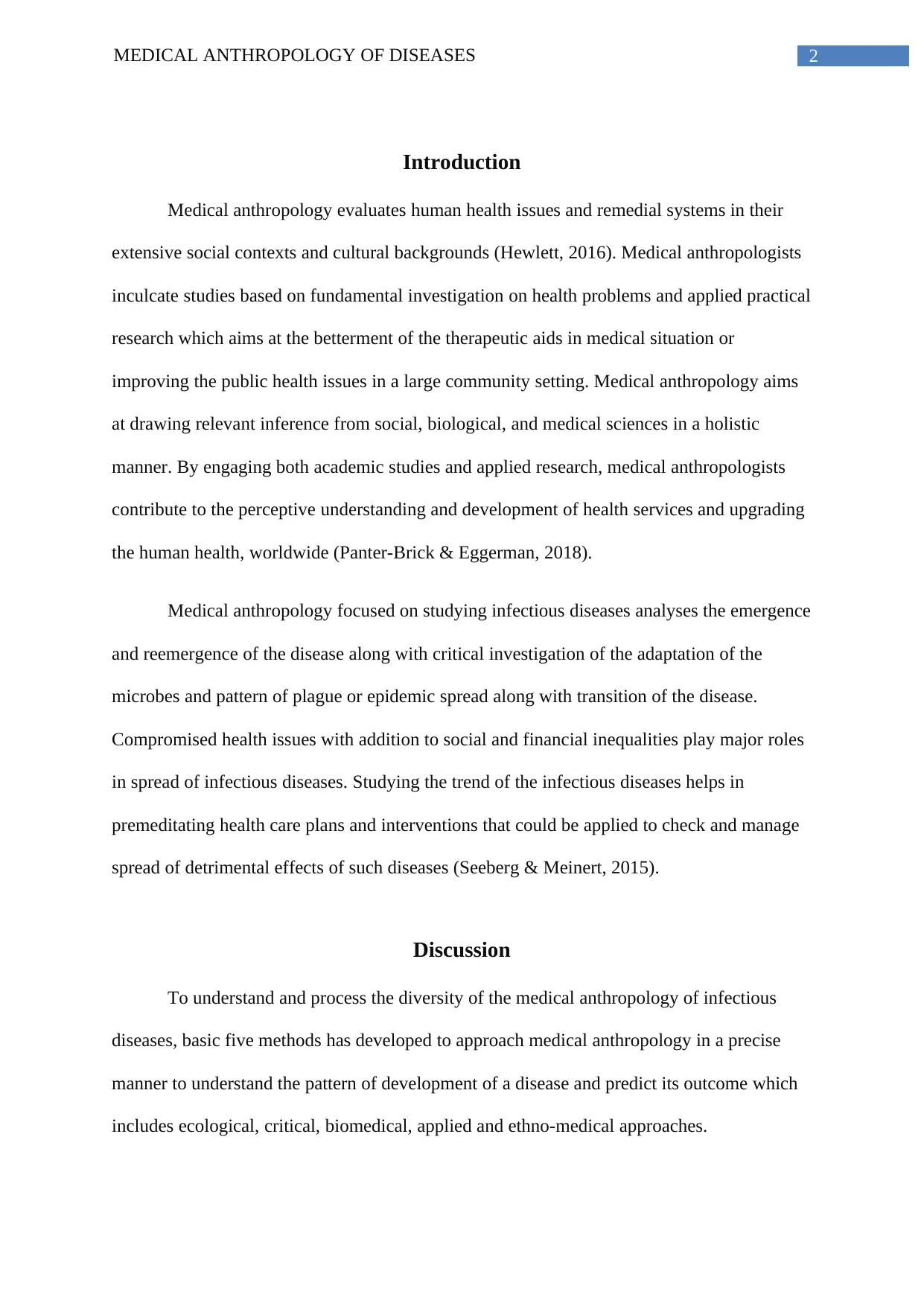
2MEDICAL ANTHROPOLOGY OF DISEASES
Introduction
Medical anthropology evaluates human health issues and remedial systems in their
extensive social contexts and cultural backgrounds (Hewlett, 2016). Medical anthropologists
inculcate studies based on fundamental investigation on health problems and applied practical
research which aims at the betterment of the therapeutic aids in medical situation or
improving the public health issues in a large community setting. Medical anthropology aims
at drawing relevant inference from social, biological, and medical sciences in a holistic
manner. By engaging both academic studies and applied research, medical anthropologists
contribute to the perceptive understanding and development of health services and upgrading
the human health, worldwide (Panter-Brick & Eggerman, 2018).
Medical anthropology focused on studying infectious diseases analyses the emergence
and reemergence of the disease along with critical investigation of the adaptation of the
microbes and pattern of plague or epidemic spread along with transition of the disease.
Compromised health issues with addition to social and financial inequalities play major roles
in spread of infectious diseases. Studying the trend of the infectious diseases helps in
premeditating health care plans and interventions that could be applied to check and manage
spread of detrimental effects of such diseases (Seeberg & Meinert, 2015).
Discussion
To understand and process the diversity of the medical anthropology of infectious
diseases, basic five methods has developed to approach medical anthropology in a precise
manner to understand the pattern of development of a disease and predict its outcome which
includes ecological, critical, biomedical, applied and ethno-medical approaches.
Introduction
Medical anthropology evaluates human health issues and remedial systems in their
extensive social contexts and cultural backgrounds (Hewlett, 2016). Medical anthropologists
inculcate studies based on fundamental investigation on health problems and applied practical
research which aims at the betterment of the therapeutic aids in medical situation or
improving the public health issues in a large community setting. Medical anthropology aims
at drawing relevant inference from social, biological, and medical sciences in a holistic
manner. By engaging both academic studies and applied research, medical anthropologists
contribute to the perceptive understanding and development of health services and upgrading
the human health, worldwide (Panter-Brick & Eggerman, 2018).
Medical anthropology focused on studying infectious diseases analyses the emergence
and reemergence of the disease along with critical investigation of the adaptation of the
microbes and pattern of plague or epidemic spread along with transition of the disease.
Compromised health issues with addition to social and financial inequalities play major roles
in spread of infectious diseases. Studying the trend of the infectious diseases helps in
premeditating health care plans and interventions that could be applied to check and manage
spread of detrimental effects of such diseases (Seeberg & Meinert, 2015).
Discussion
To understand and process the diversity of the medical anthropology of infectious
diseases, basic five methods has developed to approach medical anthropology in a precise
manner to understand the pattern of development of a disease and predict its outcome which
includes ecological, critical, biomedical, applied and ethno-medical approaches.
⊘ This is a preview!⊘
Do you want full access?
Subscribe today to unlock all pages.

Trusted by 1+ million students worldwide
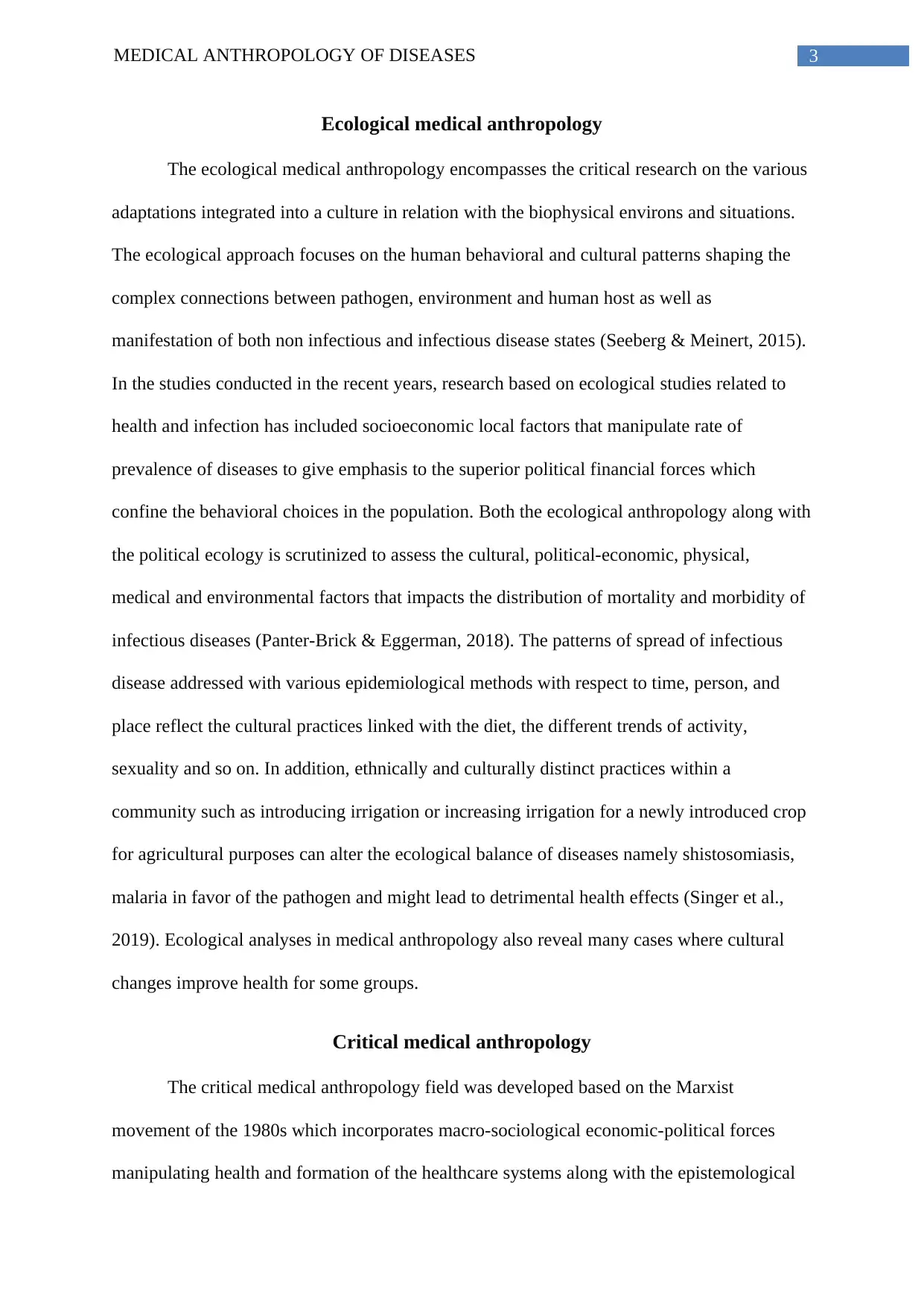
3MEDICAL ANTHROPOLOGY OF DISEASES
Ecological medical anthropology
The ecological medical anthropology encompasses the critical research on the various
adaptations integrated into a culture in relation with the biophysical environs and situations.
The ecological approach focuses on the human behavioral and cultural patterns shaping the
complex connections between pathogen, environment and human host as well as
manifestation of both non infectious and infectious disease states (Seeberg & Meinert, 2015).
In the studies conducted in the recent years, research based on ecological studies related to
health and infection has included socioeconomic local factors that manipulate rate of
prevalence of diseases to give emphasis to the superior political financial forces which
confine the behavioral choices in the population. Both the ecological anthropology along with
the political ecology is scrutinized to assess the cultural, political-economic, physical,
medical and environmental factors that impacts the distribution of mortality and morbidity of
infectious diseases (Panter-Brick & Eggerman, 2018). The patterns of spread of infectious
disease addressed with various epidemiological methods with respect to time, person, and
place reflect the cultural practices linked with the diet, the different trends of activity,
sexuality and so on. In addition, ethnically and culturally distinct practices within a
community such as introducing irrigation or increasing irrigation for a newly introduced crop
for agricultural purposes can alter the ecological balance of diseases namely shistosomiasis,
malaria in favor of the pathogen and might lead to detrimental health effects (Singer et al.,
2019). Ecological analyses in medical anthropology also reveal many cases where cultural
changes improve health for some groups.
Critical medical anthropology
The critical medical anthropology field was developed based on the Marxist
movement of the 1980s which incorporates macro-sociological economic-political forces
manipulating health and formation of the healthcare systems along with the epistemological
Ecological medical anthropology
The ecological medical anthropology encompasses the critical research on the various
adaptations integrated into a culture in relation with the biophysical environs and situations.
The ecological approach focuses on the human behavioral and cultural patterns shaping the
complex connections between pathogen, environment and human host as well as
manifestation of both non infectious and infectious disease states (Seeberg & Meinert, 2015).
In the studies conducted in the recent years, research based on ecological studies related to
health and infection has included socioeconomic local factors that manipulate rate of
prevalence of diseases to give emphasis to the superior political financial forces which
confine the behavioral choices in the population. Both the ecological anthropology along with
the political ecology is scrutinized to assess the cultural, political-economic, physical,
medical and environmental factors that impacts the distribution of mortality and morbidity of
infectious diseases (Panter-Brick & Eggerman, 2018). The patterns of spread of infectious
disease addressed with various epidemiological methods with respect to time, person, and
place reflect the cultural practices linked with the diet, the different trends of activity,
sexuality and so on. In addition, ethnically and culturally distinct practices within a
community such as introducing irrigation or increasing irrigation for a newly introduced crop
for agricultural purposes can alter the ecological balance of diseases namely shistosomiasis,
malaria in favor of the pathogen and might lead to detrimental health effects (Singer et al.,
2019). Ecological analyses in medical anthropology also reveal many cases where cultural
changes improve health for some groups.
Critical medical anthropology
The critical medical anthropology field was developed based on the Marxist
movement of the 1980s which incorporates macro-sociological economic-political forces
manipulating health and formation of the healthcare systems along with the epistemological
Paraphrase This Document
Need a fresh take? Get an instant paraphrase of this document with our AI Paraphraser
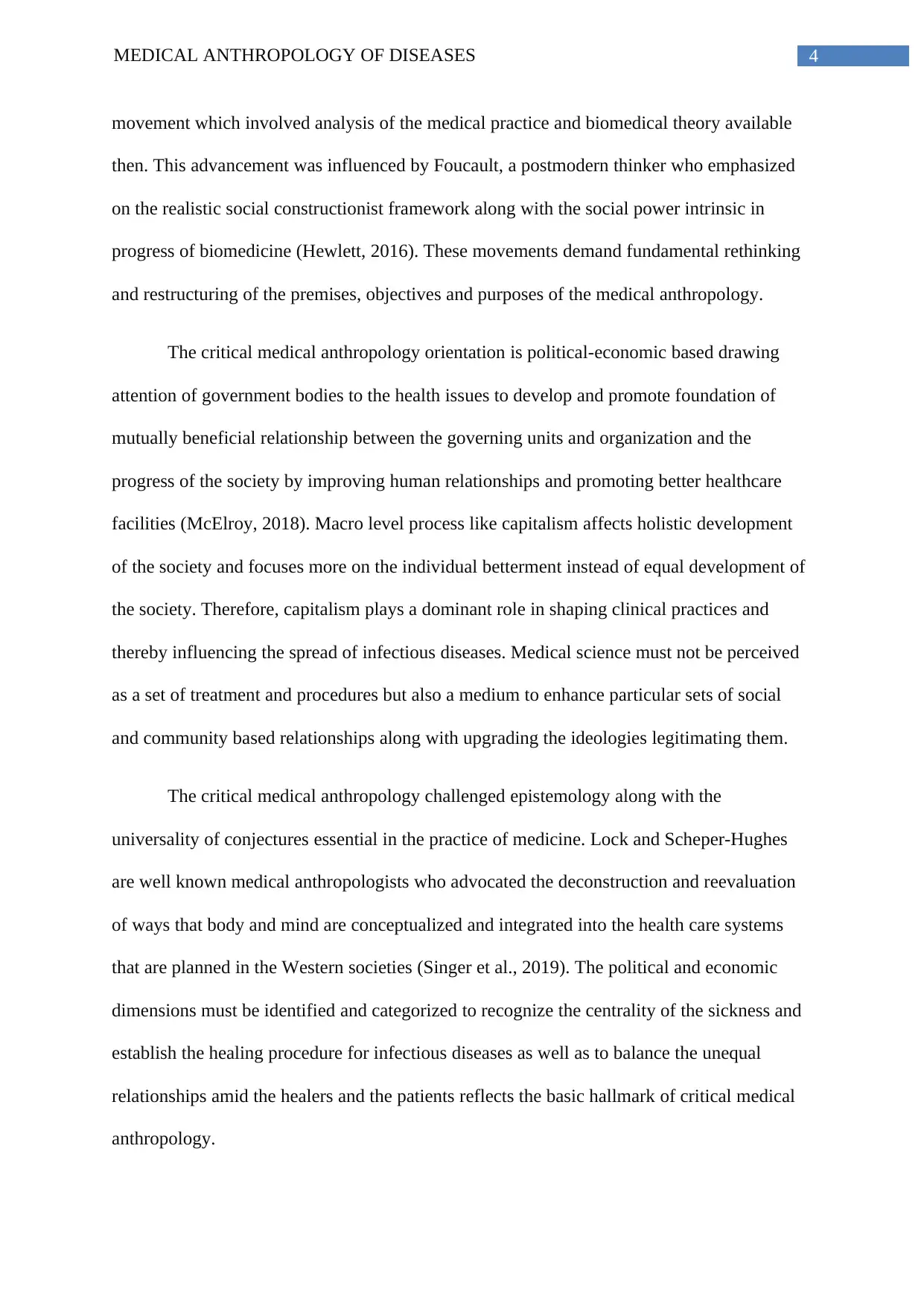
4MEDICAL ANTHROPOLOGY OF DISEASES
movement which involved analysis of the medical practice and biomedical theory available
then. This advancement was influenced by Foucault, a postmodern thinker who emphasized
on the realistic social constructionist framework along with the social power intrinsic in
progress of biomedicine (Hewlett, 2016). These movements demand fundamental rethinking
and restructuring of the premises, objectives and purposes of the medical anthropology.
The critical medical anthropology orientation is political-economic based drawing
attention of government bodies to the health issues to develop and promote foundation of
mutually beneficial relationship between the governing units and organization and the
progress of the society by improving human relationships and promoting better healthcare
facilities (McElroy, 2018). Macro level process like capitalism affects holistic development
of the society and focuses more on the individual betterment instead of equal development of
the society. Therefore, capitalism plays a dominant role in shaping clinical practices and
thereby influencing the spread of infectious diseases. Medical science must not be perceived
as a set of treatment and procedures but also a medium to enhance particular sets of social
and community based relationships along with upgrading the ideologies legitimating them.
The critical medical anthropology challenged epistemology along with the
universality of conjectures essential in the practice of medicine. Lock and Scheper-Hughes
are well known medical anthropologists who advocated the deconstruction and reevaluation
of ways that body and mind are conceptualized and integrated into the health care systems
that are planned in the Western societies (Singer et al., 2019). The political and economic
dimensions must be identified and categorized to recognize the centrality of the sickness and
establish the healing procedure for infectious diseases as well as to balance the unequal
relationships amid the healers and the patients reflects the basic hallmark of critical medical
anthropology.
movement which involved analysis of the medical practice and biomedical theory available
then. This advancement was influenced by Foucault, a postmodern thinker who emphasized
on the realistic social constructionist framework along with the social power intrinsic in
progress of biomedicine (Hewlett, 2016). These movements demand fundamental rethinking
and restructuring of the premises, objectives and purposes of the medical anthropology.
The critical medical anthropology orientation is political-economic based drawing
attention of government bodies to the health issues to develop and promote foundation of
mutually beneficial relationship between the governing units and organization and the
progress of the society by improving human relationships and promoting better healthcare
facilities (McElroy, 2018). Macro level process like capitalism affects holistic development
of the society and focuses more on the individual betterment instead of equal development of
the society. Therefore, capitalism plays a dominant role in shaping clinical practices and
thereby influencing the spread of infectious diseases. Medical science must not be perceived
as a set of treatment and procedures but also a medium to enhance particular sets of social
and community based relationships along with upgrading the ideologies legitimating them.
The critical medical anthropology challenged epistemology along with the
universality of conjectures essential in the practice of medicine. Lock and Scheper-Hughes
are well known medical anthropologists who advocated the deconstruction and reevaluation
of ways that body and mind are conceptualized and integrated into the health care systems
that are planned in the Western societies (Singer et al., 2019). The political and economic
dimensions must be identified and categorized to recognize the centrality of the sickness and
establish the healing procedure for infectious diseases as well as to balance the unequal
relationships amid the healers and the patients reflects the basic hallmark of critical medical
anthropology.
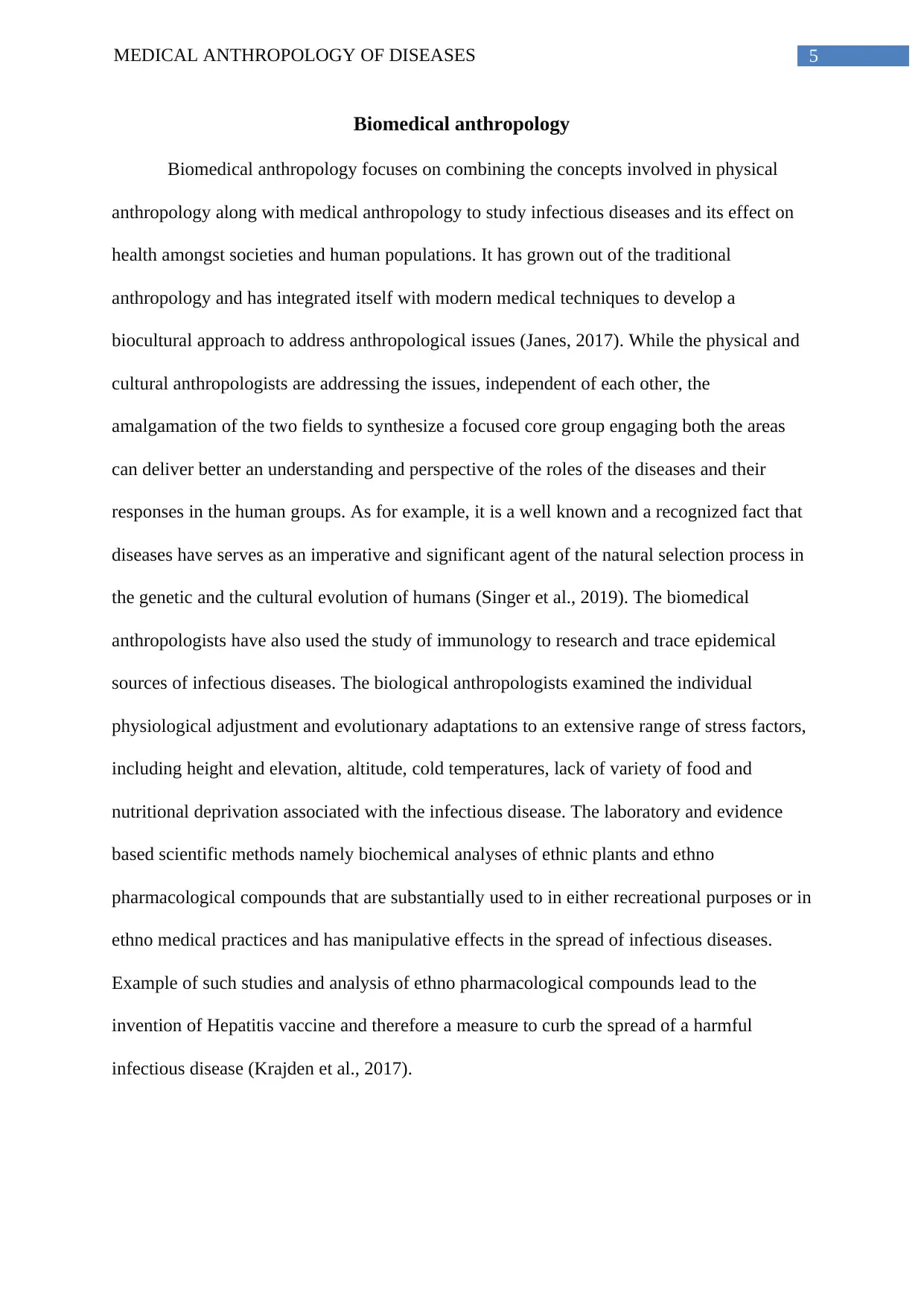
5MEDICAL ANTHROPOLOGY OF DISEASES
Biomedical anthropology
Biomedical anthropology focuses on combining the concepts involved in physical
anthropology along with medical anthropology to study infectious diseases and its effect on
health amongst societies and human populations. It has grown out of the traditional
anthropology and has integrated itself with modern medical techniques to develop a
biocultural approach to address anthropological issues (Janes, 2017). While the physical and
cultural anthropologists are addressing the issues, independent of each other, the
amalgamation of the two fields to synthesize a focused core group engaging both the areas
can deliver better an understanding and perspective of the roles of the diseases and their
responses in the human groups. As for example, it is a well known and a recognized fact that
diseases have serves as an imperative and significant agent of the natural selection process in
the genetic and the cultural evolution of humans (Singer et al., 2019). The biomedical
anthropologists have also used the study of immunology to research and trace epidemical
sources of infectious diseases. The biological anthropologists examined the individual
physiological adjustment and evolutionary adaptations to an extensive range of stress factors,
including height and elevation, altitude, cold temperatures, lack of variety of food and
nutritional deprivation associated with the infectious disease. The laboratory and evidence
based scientific methods namely biochemical analyses of ethnic plants and ethno
pharmacological compounds that are substantially used to in either recreational purposes or in
ethno medical practices and has manipulative effects in the spread of infectious diseases.
Example of such studies and analysis of ethno pharmacological compounds lead to the
invention of Hepatitis vaccine and therefore a measure to curb the spread of a harmful
infectious disease (Krajden et al., 2017).
Biomedical anthropology
Biomedical anthropology focuses on combining the concepts involved in physical
anthropology along with medical anthropology to study infectious diseases and its effect on
health amongst societies and human populations. It has grown out of the traditional
anthropology and has integrated itself with modern medical techniques to develop a
biocultural approach to address anthropological issues (Janes, 2017). While the physical and
cultural anthropologists are addressing the issues, independent of each other, the
amalgamation of the two fields to synthesize a focused core group engaging both the areas
can deliver better an understanding and perspective of the roles of the diseases and their
responses in the human groups. As for example, it is a well known and a recognized fact that
diseases have serves as an imperative and significant agent of the natural selection process in
the genetic and the cultural evolution of humans (Singer et al., 2019). The biomedical
anthropologists have also used the study of immunology to research and trace epidemical
sources of infectious diseases. The biological anthropologists examined the individual
physiological adjustment and evolutionary adaptations to an extensive range of stress factors,
including height and elevation, altitude, cold temperatures, lack of variety of food and
nutritional deprivation associated with the infectious disease. The laboratory and evidence
based scientific methods namely biochemical analyses of ethnic plants and ethno
pharmacological compounds that are substantially used to in either recreational purposes or in
ethno medical practices and has manipulative effects in the spread of infectious diseases.
Example of such studies and analysis of ethno pharmacological compounds lead to the
invention of Hepatitis vaccine and therefore a measure to curb the spread of a harmful
infectious disease (Krajden et al., 2017).
⊘ This is a preview!⊘
Do you want full access?
Subscribe today to unlock all pages.

Trusted by 1+ million students worldwide
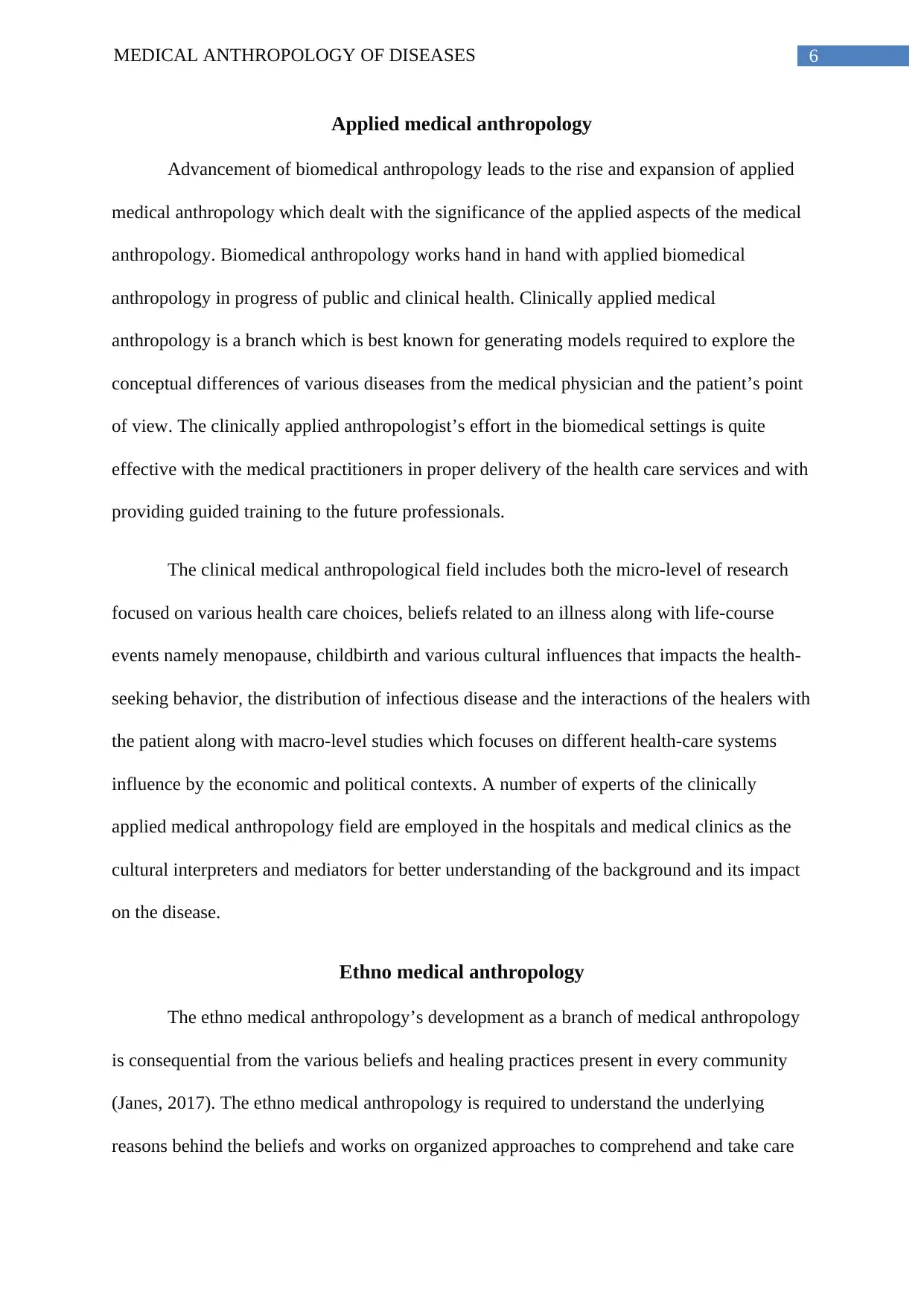
6MEDICAL ANTHROPOLOGY OF DISEASES
Applied medical anthropology
Advancement of biomedical anthropology leads to the rise and expansion of applied
medical anthropology which dealt with the significance of the applied aspects of the medical
anthropology. Biomedical anthropology works hand in hand with applied biomedical
anthropology in progress of public and clinical health. Clinically applied medical
anthropology is a branch which is best known for generating models required to explore the
conceptual differences of various diseases from the medical physician and the patient’s point
of view. The clinically applied anthropologist’s effort in the biomedical settings is quite
effective with the medical practitioners in proper delivery of the health care services and with
providing guided training to the future professionals.
The clinical medical anthropological field includes both the micro-level of research
focused on various health care choices, beliefs related to an illness along with life-course
events namely menopause, childbirth and various cultural influences that impacts the health-
seeking behavior, the distribution of infectious disease and the interactions of the healers with
the patient along with macro-level studies which focuses on different health-care systems
influence by the economic and political contexts. A number of experts of the clinically
applied medical anthropology field are employed in the hospitals and medical clinics as the
cultural interpreters and mediators for better understanding of the background and its impact
on the disease.
Ethno medical anthropology
The ethno medical anthropology’s development as a branch of medical anthropology
is consequential from the various beliefs and healing practices present in every community
(Janes, 2017). The ethno medical anthropology is required to understand the underlying
reasons behind the beliefs and works on organized approaches to comprehend and take care
Applied medical anthropology
Advancement of biomedical anthropology leads to the rise and expansion of applied
medical anthropology which dealt with the significance of the applied aspects of the medical
anthropology. Biomedical anthropology works hand in hand with applied biomedical
anthropology in progress of public and clinical health. Clinically applied medical
anthropology is a branch which is best known for generating models required to explore the
conceptual differences of various diseases from the medical physician and the patient’s point
of view. The clinically applied anthropologist’s effort in the biomedical settings is quite
effective with the medical practitioners in proper delivery of the health care services and with
providing guided training to the future professionals.
The clinical medical anthropological field includes both the micro-level of research
focused on various health care choices, beliefs related to an illness along with life-course
events namely menopause, childbirth and various cultural influences that impacts the health-
seeking behavior, the distribution of infectious disease and the interactions of the healers with
the patient along with macro-level studies which focuses on different health-care systems
influence by the economic and political contexts. A number of experts of the clinically
applied medical anthropology field are employed in the hospitals and medical clinics as the
cultural interpreters and mediators for better understanding of the background and its impact
on the disease.
Ethno medical anthropology
The ethno medical anthropology’s development as a branch of medical anthropology
is consequential from the various beliefs and healing practices present in every community
(Janes, 2017). The ethno medical anthropology is required to understand the underlying
reasons behind the beliefs and works on organized approaches to comprehend and take care
Paraphrase This Document
Need a fresh take? Get an instant paraphrase of this document with our AI Paraphraser
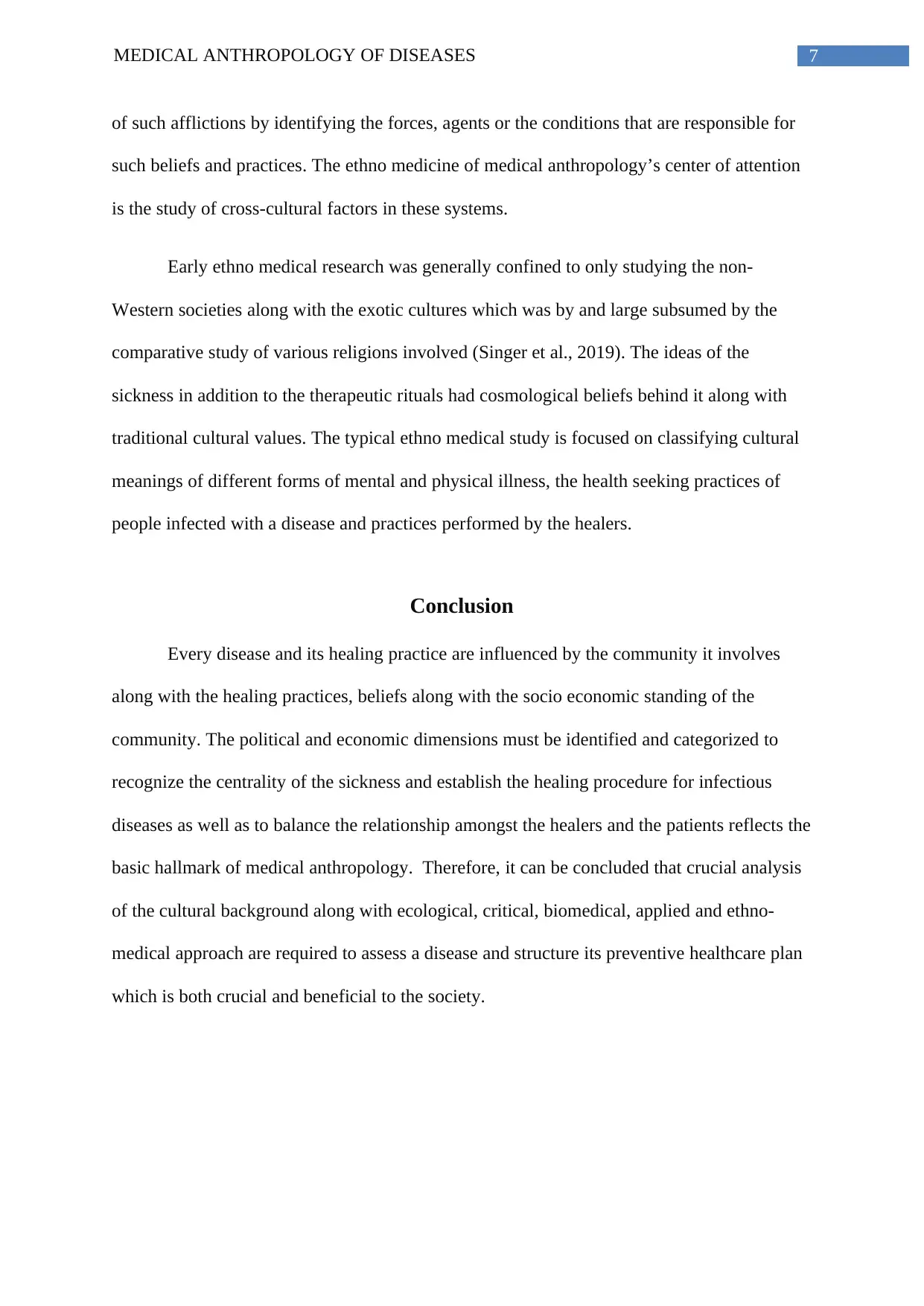
7MEDICAL ANTHROPOLOGY OF DISEASES
of such afflictions by identifying the forces, agents or the conditions that are responsible for
such beliefs and practices. The ethno medicine of medical anthropology’s center of attention
is the study of cross-cultural factors in these systems.
Early ethno medical research was generally confined to only studying the non-
Western societies along with the exotic cultures which was by and large subsumed by the
comparative study of various religions involved (Singer et al., 2019). The ideas of the
sickness in addition to the therapeutic rituals had cosmological beliefs behind it along with
traditional cultural values. The typical ethno medical study is focused on classifying cultural
meanings of different forms of mental and physical illness, the health seeking practices of
people infected with a disease and practices performed by the healers.
Conclusion
Every disease and its healing practice are influenced by the community it involves
along with the healing practices, beliefs along with the socio economic standing of the
community. The political and economic dimensions must be identified and categorized to
recognize the centrality of the sickness and establish the healing procedure for infectious
diseases as well as to balance the relationship amongst the healers and the patients reflects the
basic hallmark of medical anthropology. Therefore, it can be concluded that crucial analysis
of the cultural background along with ecological, critical, biomedical, applied and ethno-
medical approach are required to assess a disease and structure its preventive healthcare plan
which is both crucial and beneficial to the society.
of such afflictions by identifying the forces, agents or the conditions that are responsible for
such beliefs and practices. The ethno medicine of medical anthropology’s center of attention
is the study of cross-cultural factors in these systems.
Early ethno medical research was generally confined to only studying the non-
Western societies along with the exotic cultures which was by and large subsumed by the
comparative study of various religions involved (Singer et al., 2019). The ideas of the
sickness in addition to the therapeutic rituals had cosmological beliefs behind it along with
traditional cultural values. The typical ethno medical study is focused on classifying cultural
meanings of different forms of mental and physical illness, the health seeking practices of
people infected with a disease and practices performed by the healers.
Conclusion
Every disease and its healing practice are influenced by the community it involves
along with the healing practices, beliefs along with the socio economic standing of the
community. The political and economic dimensions must be identified and categorized to
recognize the centrality of the sickness and establish the healing procedure for infectious
diseases as well as to balance the relationship amongst the healers and the patients reflects the
basic hallmark of medical anthropology. Therefore, it can be concluded that crucial analysis
of the cultural background along with ecological, critical, biomedical, applied and ethno-
medical approach are required to assess a disease and structure its preventive healthcare plan
which is both crucial and beneficial to the society.
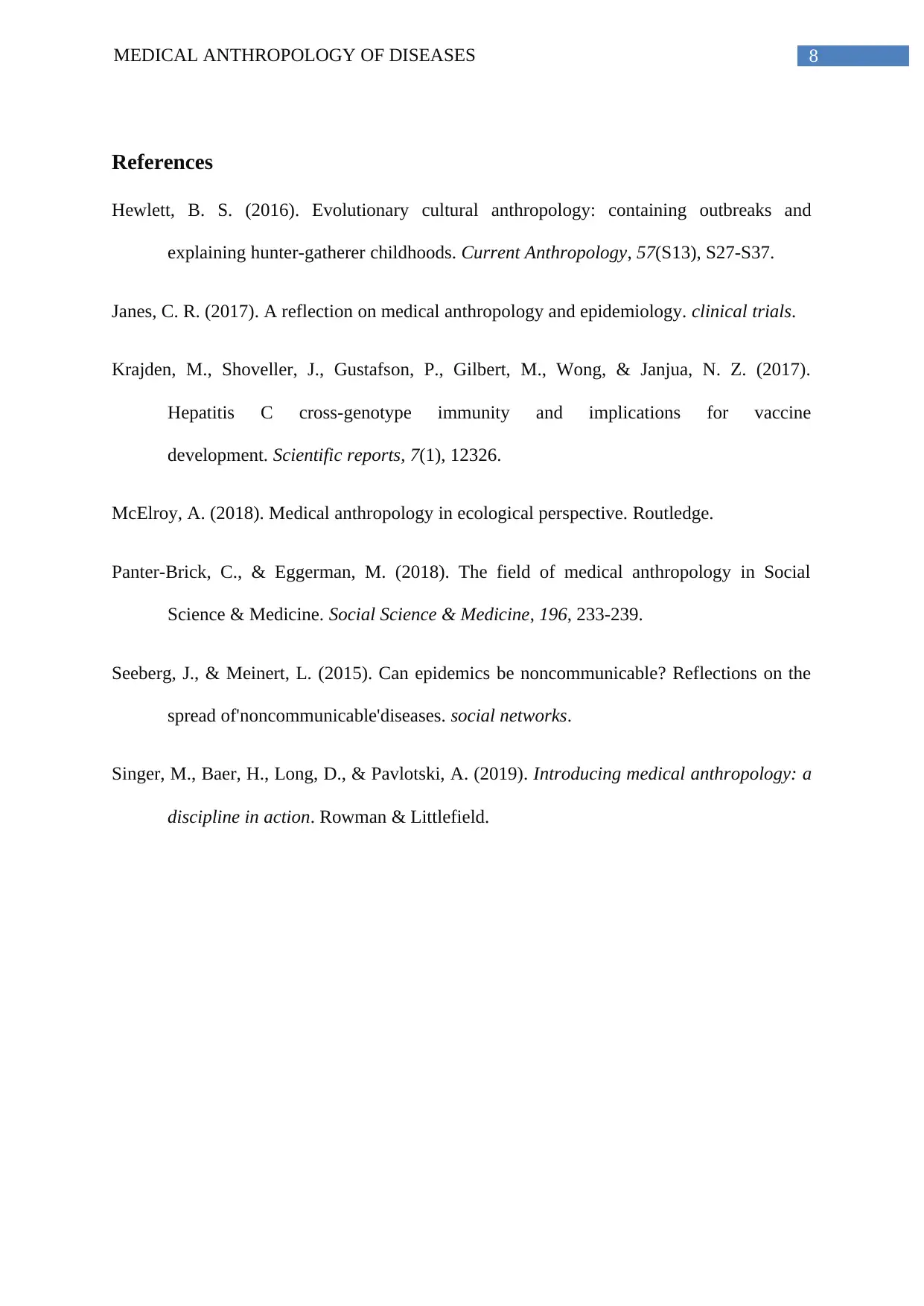
8MEDICAL ANTHROPOLOGY OF DISEASES
References
Hewlett, B. S. (2016). Evolutionary cultural anthropology: containing outbreaks and
explaining hunter-gatherer childhoods. Current Anthropology, 57(S13), S27-S37.
Janes, C. R. (2017). A reflection on medical anthropology and epidemiology. clinical trials.
Krajden, M., Shoveller, J., Gustafson, P., Gilbert, M., Wong, & Janjua, N. Z. (2017).
Hepatitis C cross-genotype immunity and implications for vaccine
development. Scientific reports, 7(1), 12326.
McElroy, A. (2018). Medical anthropology in ecological perspective. Routledge.
Panter-Brick, C., & Eggerman, M. (2018). The field of medical anthropology in Social
Science & Medicine. Social Science & Medicine, 196, 233-239.
Seeberg, J., & Meinert, L. (2015). Can epidemics be noncommunicable? Reflections on the
spread of'noncommunicable'diseases. social networks.
Singer, M., Baer, H., Long, D., & Pavlotski, A. (2019). Introducing medical anthropology: a
discipline in action. Rowman & Littlefield.
References
Hewlett, B. S. (2016). Evolutionary cultural anthropology: containing outbreaks and
explaining hunter-gatherer childhoods. Current Anthropology, 57(S13), S27-S37.
Janes, C. R. (2017). A reflection on medical anthropology and epidemiology. clinical trials.
Krajden, M., Shoveller, J., Gustafson, P., Gilbert, M., Wong, & Janjua, N. Z. (2017).
Hepatitis C cross-genotype immunity and implications for vaccine
development. Scientific reports, 7(1), 12326.
McElroy, A. (2018). Medical anthropology in ecological perspective. Routledge.
Panter-Brick, C., & Eggerman, M. (2018). The field of medical anthropology in Social
Science & Medicine. Social Science & Medicine, 196, 233-239.
Seeberg, J., & Meinert, L. (2015). Can epidemics be noncommunicable? Reflections on the
spread of'noncommunicable'diseases. social networks.
Singer, M., Baer, H., Long, D., & Pavlotski, A. (2019). Introducing medical anthropology: a
discipline in action. Rowman & Littlefield.
⊘ This is a preview!⊘
Do you want full access?
Subscribe today to unlock all pages.

Trusted by 1+ million students worldwide
1 out of 9
Related Documents
Your All-in-One AI-Powered Toolkit for Academic Success.
+13062052269
info@desklib.com
Available 24*7 on WhatsApp / Email
![[object Object]](/_next/static/media/star-bottom.7253800d.svg)
Unlock your academic potential
Copyright © 2020–2026 A2Z Services. All Rights Reserved. Developed and managed by ZUCOL.




